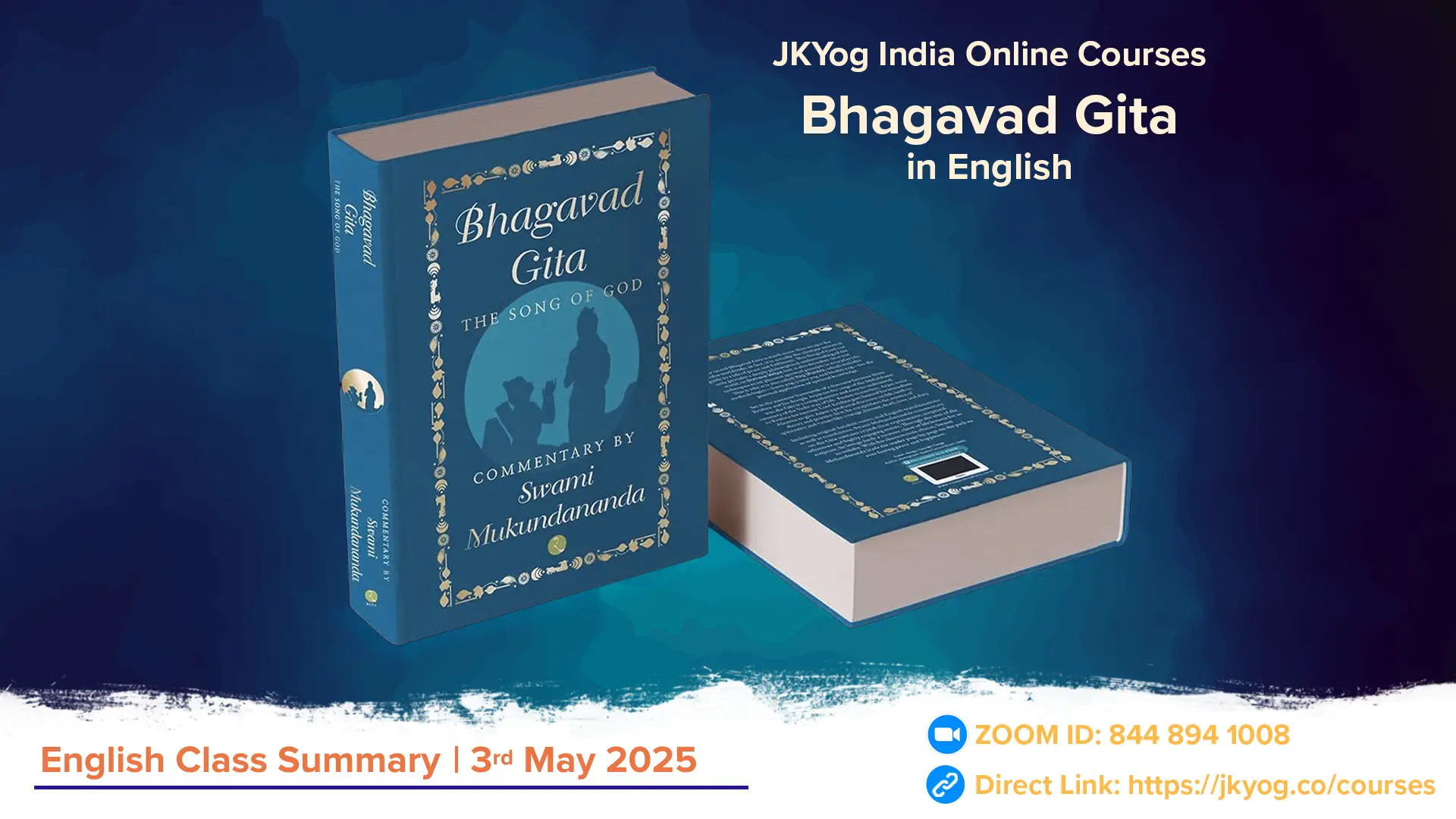Gita 11.19
अनादिमध्यान्तमनन्तवीर्य-
मनन्तबाहुं शशिसूर्यनेत्रम् |
पश्यामि त्वां दीप्तहुताशवक्त्रं-
स्वतेजसा विश्वमिदं तपन्तम् || 19||
anādi-madhyāntam ananta-vīryam
ananta-bāhuṁ śhaśhi-sūrya-netram
paśhyāmi tvāṁ dīpta-hutāśha-vaktraṁ
sva-tejasā viśhvam idaṁ tapantam
Arjun repeatedly emphasises that God is without beginning, middle, or end, expressing his awe at witnessing such a divine form. Repetition in wonder is natural and not a flaw. The divine is beyond space, time, and causation, which are contained within Him. The sun, moon, and stars derive their energy from God, who sustains the universe by providing its warmth.
Gita 11.20
द्यावापृथिव्योरिदमन्तरं हि
व्याप्तं त्वयैकेन दिशश्च सर्वा: |
दृष्ट्वाद्भुतं रूपमुग्रं तवेदं
लोकत्रयं प्रव्यथितं महात्मन् || 20||
dyāv ā-pṛithivyor idam antaraṁ hi
vyāptaṁ tvayaikena diśhaśh cha sarvāḥ
dṛiṣhṭvādbhutaṁ rūpam ugraṁ tavedaṁ
loka-trayaṁ pravyathitaṁ mahātman
Arjun describes God as omnipresent, filling all directions and instilling fear in all beings. Although they haven't seen His form, the fear arises because everyone is bound by God's laws and must submit to them. The world operates according to the law of karma—every action has its corresponding result. Just as scientists discover physical laws, but cannot create them, God is the supreme law-maker whose laws govern all existence.
Gita 11.21
अमी हि त्वां सुरसङ्घा विशन्ति
केचिद्भीता: प्राञ्जलयो गृणन्ति |
स्वस्तीत्युक्त्वा महर्षिसिद्धसङ्घा:
स्तुवन्ति त्वां स्तुतिभि: पुष्कलाभि: || 21||
amī hi tvāṁ sura-saṅghā viśhanti
kechid bhītāḥ prāñjalayo gṛiṇanti
svastīty uktvā maharṣhi-siddha-saṅghāḥ
stuvanti tvāṁ stutibhiḥ puṣhkalābhiḥ
Arjun perceives Shree Krishna’s kāla rūp, the form of all-consuming time, which devours even celestial gods. He sees celestial beings entering this universal form in reverence, while sages and enlightened souls praise the Lord through their thoughts, words, and actions.
Gita 11.22
रुद्रादित्या वसवो ये च साध्या
विश्वेऽश्विनौ मरुतश्चोष्मपाश्च |
गन्धर्वयक्षासुरसिद्धसङ्घा
वीक्षन्ते त्वां विस्मिताश्चैव सर्वे || 22||
rudrādityā vasavo ye cha sādhyā
viśhve ’śhvinau marutaśh choṣhmapāśh cha
gandharva-yakṣhāsura-siddha-saṅghā
vīkṣhante tvāṁ vismitāśh chaiva sarve
All beings derive their roles from God's power and perform their duties in accordance with creation's laws. They observe the cosmic form of God with awe.
Gita 11.23
रूपं महत्ते बहुवक्त्रनेत्रं
महाबाहो बहुबाहूरुपादम् |
बहूदरं बहुदंष्ट्राकरालं
दृष्ट्वा लोका: प्रव्यथितास्तथाहम् || 23||
rūpaṁ mahat te bahu-vaktra-netraṁ
mahā-bāho bahu-bāhūru-pādam
bahūdaraṁ bahu-danṣhṭrā-karālaṁ
dṛiṣhṭvā lokāḥ pravyathitās tathāham
The divine form of God is omnipresent, with countless heads, eyes, and feet that encompass and transcend the universe, residing within all beings. Both the observers and the observed are part of God's universal form. Additionally, the fear of God governs natural phenomena—fire burns, the sun shines, the wind blows, rain falls, and even death fears Him—highlighting His supreme power.
Gita 11.24
नभ:स्पृशं दीप्तमनेकवर्णं
व्यात्ताननं दीप्तविशालनेत्रम् |
दृष्ट्वा हि त्वां प्रव्यथितान्तरात्मा
धृतिं न विन्दामि शमं च विष्णो || 24||
nabhaḥ-spṛiśhaṁ dīptam aneka-varṇaṁ
vyāttānanaṁ dīpta-viśhāla-netram
dṛiṣhṭvā hi tvāṁ pravyathitāntar-ātmā
dhṛitiṁ na vindāmi śhamaṁ cha viṣhṇo
Seeing Krishna’s cosmic form transformed Arjun’s relationship from that of a close friend to one of awe and reverence. While he knew Krishna was divine, his overwhelming love made him forget his divine nature, focusing solely on their personal bond. Love naturally absorbs the devotee’s mind, causing them to forget formal distinctions; if they remember them, love cannot fully flourish.
This is similar to a wife who deeply loves her husband but interacts intimately only when she sees him as her beloved, not as a governor. In devotion, true love immerses the devotee in the affectionate sentiment, making formal roles fade.
The cowherd friends of Braj who played with Krishna as their dear friend, unaware of his divine power. When Krishna lifted Govardhan Hill, his friends doubted his divine ability until they saw Indra’s defeat. Their reverence grew, but Krishna, wishing to maintain their intimacy, made them forget their awe through Yogmaya.
Gita 11.25
दंष्ट्राकरालानि च ते मुखानि
दृष्ट्वैव कालानलसन्निभानि |
दिशो न जाने न लभे च शर्म
प्रसीद देवेश जगन्निवास || 25||
danṣhṭrā-karālāni cha te mukhāni
dṛiṣhṭvaiva kālānala-sannibhāni
diśho na jāne na labhe cha śharma
prasīda deveśha jagan-nivāsa
The universal form that Arjun witnesses is another aspect of Shree Krishna's divine personality, non-different from him. However, this awe-inspiring vision overwhelms Arjun, causing his previous camaraderie and trust in Krishna to fade. Filled with fear by the wondrous and terrifying manifestations of God, Arjuna mistakenly believes that Krishna is angry with him. In his fear, he pleads for mercy.
Gita 11.26 & 11.27
अमी च त्वां धृतराष्ट्रस्य पुत्रा:
सर्वे सहैवावनिपालसङ्घै: |
भीष्मो द्रोण: सूतपुत्रस्तथासौ
सहास्मदीयैरपि योधमुख्यै: || 26||
वक्त्राणि ते त्वरमाणा विशन्ति
दंष्ट्राकरालानि भयानकानि |
केचिद्विलग्ना दशनान्तरेषु
सन्दृश्यन्ते चूर्णितैरुत्तमाङ्गै: || 27||
amī cha tvāṁ dhṛitarāśhtrasya putrāḥ
sarve sahaivāvani-pāla-saṅghaiḥ
bhīṣhmo droṇaḥ sūta-putras tathāsau
sahāsmadīyair api yodha-mukhyaiḥ
vaktrāṇi te tvaramāṇā viśhanti
danṣhṭrā-karālāni bhayānakāni
kechid vilagnā daśhanāntareṣhu
sandṛiśhyante chūrṇitair uttamāṅgaiḥ
In the cosmic vision, Arjun perceives the formidable teeth of Shree Krishna as symbols of divine destruction—representing time’s relentless force that ultimately consumes all beings. Just as teeth grind food, God's teeth symbolise the destructive power of time that gradually destroys everything. Arjun sees the great warriors—both Kaurava and also many of the Pandavas generals—rushing into God’s mouth, signifying their imminent death and the inevitable passage of time. This vision embodies the idea that the past, present, and future exist within the divine, beyond the limits of time.
The warriors Bheeshma, Dronacharya, and Karn, despite their heroism, are destined to die in this war because they fought against the Supreme Lord Krishna, who is beyond time. Bheeshma, known for his vows and support of Duryodhan, recognises that fighting Krishna would lead to his death. Dronacharya, the revered martial teacher, and Karn, the valiant prince and friend of Duryodhan, also face their inevitable fate due to their allegiance. Their stories highlight the inescapable destiny of death for those opposing the divine, reinforcing the understanding that the divine universal form encompasses the ultimate power of destruction governed by time.
Summary: JKYog India Online Class- Bhagavad Gita [English]- 3.5.2025








